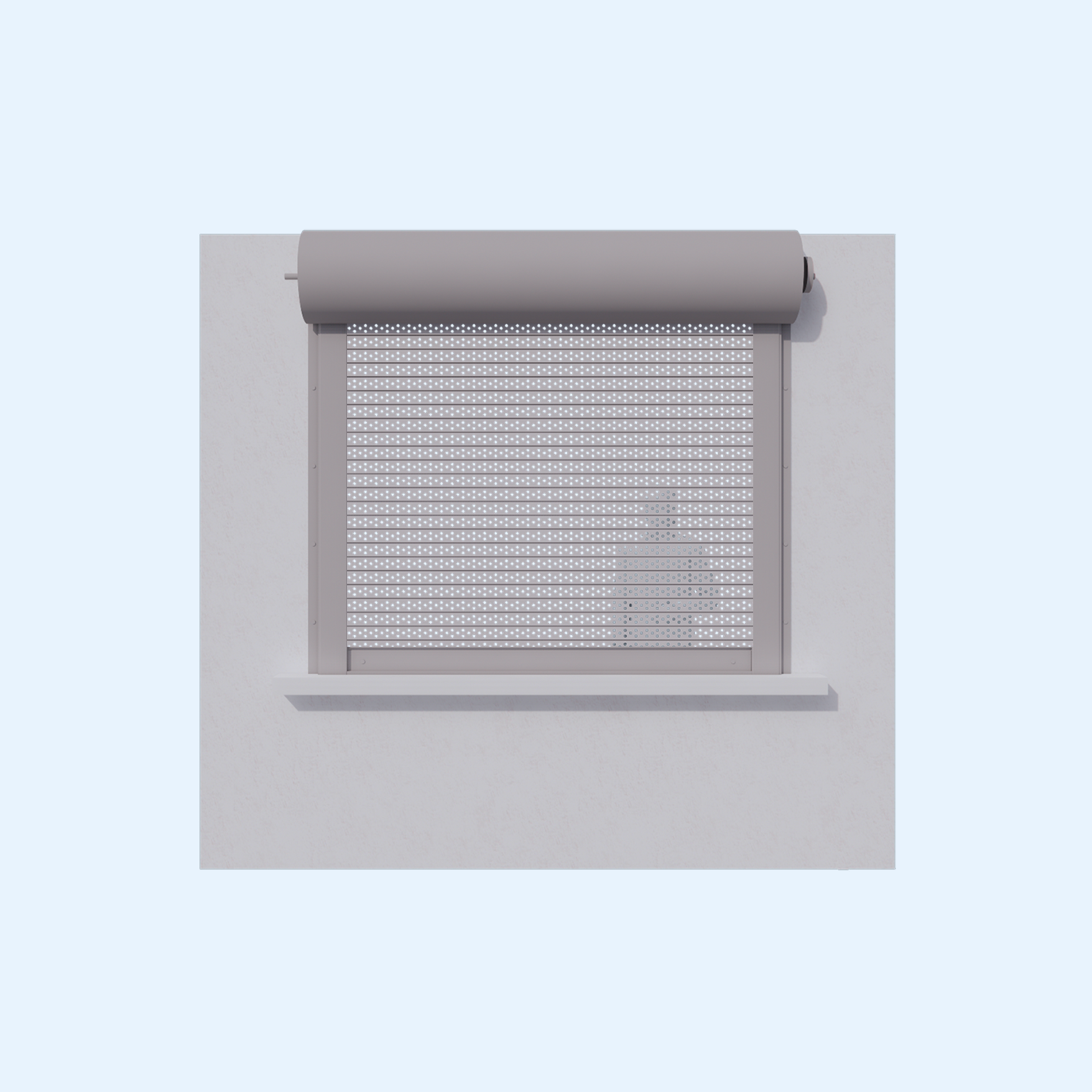Counter Perforated Door
Overview:
Counter perforated rolling doors combine security with visibility, making it an excellent choice for applications where controlled access and observation are vital. Ideal for service counters, reception areas, or retail spaces, these doors provide a secure barrier while allowing for visual engagement with customers. The perforated design ensures optimal airflow and visibility, making them perfect for applications where a balance between security and an open, inviting atmosphere is essential.
Hurricane and Other Approvals
Colors:
- The perforations in the door panels allow for airflow, promoting ventilation within the enclosed space
- Visibility through the door is maintained, enabling natural light to enter the premises even when the door is closed
- The design of the perforations can be customized to meet specific aesthetic and functional requirements
- Operation options by motor, chain, hand-crank, or manual push up depending on the weight and frequency of operation
- Perforated slats available in 2.0″ or 1.5″ slat widths



LISTINGS
This door meets city visibility code requirements.
Hurricane Approved as per the Florida Building Code for wind pressures of:
- +70/-70 mph
Due to the perforated curtain this door does not qualify for fire, smoke and/or sound rating.
SIZE
Standard construction in a range of sizes up to 30′ wide x 30’ high.
Please contact us if your opening is larger—sizes available of 60′ wide or more upon consultation.
CURTAIN
Perforations available in Square or Round pattern design. Slats available in 2.0″ or 1.5″ slat widths.
Pattern is available in Regular (for 2.0” slats) or Micro-Perforations (for 1.5” slats). Both perforations sizes conform to city visibility requirements.
MATERIAL & FINISH
Typical exterior finish in Galvanized, White, or Grey. Additional finish options include: Stainless Steel, Galvalume, Aluminum Mill, and Powder-Coated.
Curtain is available in 24, 22, 20 and 18 gauge. For a perforated door, the gauge is typically determined by door size.
WARRANTY
1-year warranty against defects in materials and workmanship
OPERATION
Motor, Chain, Hand-Crank or Push-Up operation available based on size, weight or frequency of operation.
Battery backup available to ensure operation in the event of power failure or blackout.
USAGE
Standard construction is up to 15,000 cycles per year with High Cycle Construction available for doors expected to be operated more than 15,000 cycles per year, i.e. parking garages, sally ports.
BOTTOM BAR
Bottom Bar options include: Single Angle, Double Angle, Tubular (extruded alum.) or “T” bottom bar.
Bottom Bars are typical Galvanized steel finish.
Additional options: Clear Anodized, Brass, Copper, Mill, Stainless Steel, Hot Rolled Steel, Powder Coated, Paint.
LOCKING
Chain Operation:
- Wall mounted chain keeper
- Zinc plated steel slide bolt with padlock provisions
Push-Up or Hand-Crank Operation:
- Slide Locks
- Round Locks
- Cylinder Locks for locking at bottom bar
Motor Operator:
- No additional locking required as the motor has automatic features to prevent the door from being lifted.
- Additional locking mechanisms include Slide Locks, Round Locks or Cylinder Locks for locking at bottom bar
*bottom bar design effects locking option available
GUIDE MATERIAL
Guides are typical Galvanized steel finish.
Additional options: Clear Anodized, Brass, Copper, Mill, Stainless Steel, Hot Rolled Steel, Powder Coated, Paint, Strip Seal, Single Angle, Double Angle, Tubular, Slope Bar, Slide Locks.
COUNTERBALANCE ASSMEBLY
Counterbalance Assembly can be Hot Rolled A36, Galvanized, Stainless Steel, Aluminum, Torsion Spring, Cycle 17.5 to 400M, Welded Tabs, Tapped Holes, Redi-Tube Motor, Thru-Shaft Push-up, Inside Charge, Lock Shaft Collar, Keyed, Bolted.
BRACKET PLATES
Bracket Plates can be Brass, Copper, Hot Rolled A36, Stainless Steel, Aluminum, Galvanized, Powder Coated, Stop Lock Bearing,Internal Charge, Chain Gearing, Round Bracket, Square Bracket, Single Gear Reducer.
HOOD / COVER
Hoods are typically furnished if the coil is exposed. If provided, hoods are typical Steel Galvanized Finish.
Additional Finish Options: Brass, Copper, Stainless Steel, Galvalume, Prime Painted, Powder Coated
Standard shape is a round cover. Options for squares or hexagonal upon request.
For aesthetic purposes if the coil is exposed there is a fascia option to hide the door in up position. Motor cover available for preventing weather intrusions and security protection.
For hand operation different cover options are available for chain mechanism to accommodate weather intrusion, security protection and aesthetics.
Covers can be provided for all exposed mechanical parts, consult the factory.
PARTIAL PERFORATED
Combine perforated slat section at eye-level with solid slats in the same curtain. Allows for ventilation with added security, while still being able to see into the next space.
PASS DOOR
Hollow metal doors are ideal in applications where space is too limited for the installation of a standard entry door. A pass door conserves energy by allowing building access via a smaller opening versus opening the entire door.
FAST ACTING DOORS
For high traffic openings or where air flow or temperature control is critical, doors can be designed to operate at more than twice the speed of typical doors, or up to 2 ft/sec
HIGH CYCLE SPRINGS
High Cycle performance available up to 100,000 cycles at an additional cost (i.e. parking garages, sally ports).
SLOPING FLOOR
Bottom bar design can be sloped to accommodate floor conditions that are not level. This allows for the opening to be entire secure and touch the floor at all points.
SAFETY EDGE
Addition of a safety edge to the bottom bar prevents damage to an object in the door’s pathway in addition to minimizing damage to the closure itself. If trying to close the door, the door will stop and open again.


